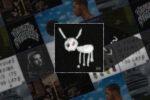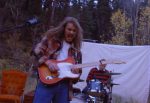“There’s reasons for heavy hearts”: This is the first line of Bartees Strange’s new album “Farm to Table,” and it could not be a more perfect opener for a musical work such as this one, which channels the feelings that accompany growing up, getting old, and trying to navigate a world in which nothing really lasts.
“Farm to Table” is made up of only 10 songs — the entire length of the album comes out to a mere 34 minutes and change — but that is all the time Strange needs to get his point across. It is a work that feels definitively indie-alt while also maintaining the genre-lessness of his first album, “Live Forever.” He certainly covers a multitude of topics on the album, but he gets to the heart of the matter immediately, and that precision is reflected in every aspect of the work.
In a world still grappling with the heart-wrenching disaster that has been the coronavirus pandemic, “Heavy Hearts” hits the nail on the head. The opening line sets the tone for both the song itself and the whole album, starting slow and sad before exploding into bright, freewheeling guitar chords that serve as the hallmark of the tunes that feel like a long road trip on a bright sunny day.
Though no other song on “Farm to Table” quite manages to capture that exact same feeling, there are several others that come quite close, tying the whole album together even where things differ thematically. Though “Mulholland Dr.,” the track immediately after “Heavy Heart,” has a bit more of a techno-esque beat to it, the guitars in the back half mirror those of the first song, channeling something with an echo of the sort of country music that Hootie and the Blowfish was known for in their heyday.
“Tours” swings more in the direction of old, classic country. It is smooth and mellow, toned-down and gritty. Here, the lyrics are the star of the show, as he croons about his parents and drops lines like “I’m your son, and that’s all I want.” For Strange, “Farm to Table” is about “looking at people who came before you,” and “Tours” is a clear reflection of that.
More importantly than that, though, “Tours” is the lead-in to “Hold the Line,” the shining star of “Farm to Table.” Strange wrote “Hold the Line” about Gianna Floyd, whose father George became the man the whole world associated with police brutality and racism following his murder in 2020.
“What happened to the man with the big ol’ smile? He’s calling to his mother now,” Strange laments, immediately putting the listener into that now-viral moment when Floyd was murdered by a police officer kneeling on his throat. For Strange, who was living in Washington, D.C., when Floyd was killed, Gianna’s loss was especially poignant.
“I remember hearing the news and watching the video and eventually seeing Gianna speak, and my first feeling was how devastated I was, because here we have this 6-year-old child having to address the free world on how her father was murdered on TV. I wish she could have been a kid a little longer,” he told NPR when asked about his inspiration for the song. He continued on by saying, “It broke my heart and I wanted to write something that nodded towards that, but also recognized that, because of her, there was this huge movement brewing. I remember looking outside and seeing all those out-of-towners flood D.C. in March, for days, and I just kept thinking, ‘This is us trying to hold the line and trying to fight for something.’”
It is, from a compositional perspective, a simple song. The lyrics are not particularly complex, and the music backing those lyrics is not either. The meaning is where the intricacy lies, and “Hold the Line” is all the more powerful for it. It also ties in well with the rest of the album, even though it is very distinct in terms of its subject matter. “Where is time?,” Strange asks in “Hold the Line,” summarizing the ethos of “Farm to Table” while also drawing the song itself to a close.
There are, of course, songs that are not as exhilarating as “Heavy Hearts” or as breathtaking and devastating as “Hold the Line.” As with any album, there are weak points — or, at a minimum, songs that are not as memorable as the rest. In the case of “Farm to Table,” “Wretched” has a vibe not entirely unlike “Heavy Hearts” but falls short of that warm, exciting quality that makes the latter so unique and noteworthy. Another part of the album that does not manage to live up to the rest is “We Were Only Close For Like Two Weeks,” a song less than a minute in length that feels more like an experimental voice memo than a fully fleshed out work. On an album that is mostly enjoyable from start to finish, this is perhaps the one song that is worthy of a skip.
Despite those shortcomings, “Farm to Table” is an incredibly strong album on the whole. One of the most impressive parts of the entire work is how interconnected it feels, even when the speed, tone and style change rapidly from one to the other. Every song contains bits and pieces of others, linking them all together in such a way that it is clear that Strange intended them to be interlinked parts of a whole.
Above all else, though, what makes “Farm to Table” so wonderful — and so unified — is how expertly Strange weaves in the throughlines of home, family and change. Whether it is references to his father in “Heavy Heart” and “Tours,” the gut punch of a line that is “I’m calling to my mother now” in “Hold the Line,” or the chattering family in the background of “Black Gold,” there is something about this album that feels universal, even despite its unusual genre-melding and varied stylistic choices. “Farm to Table” is excellent — an album that expertly blends melancholy, dread and bubbling excitement. It is, in short, an album that reflects what it feels like to grow old, with all the pain and joy that it entails.
















